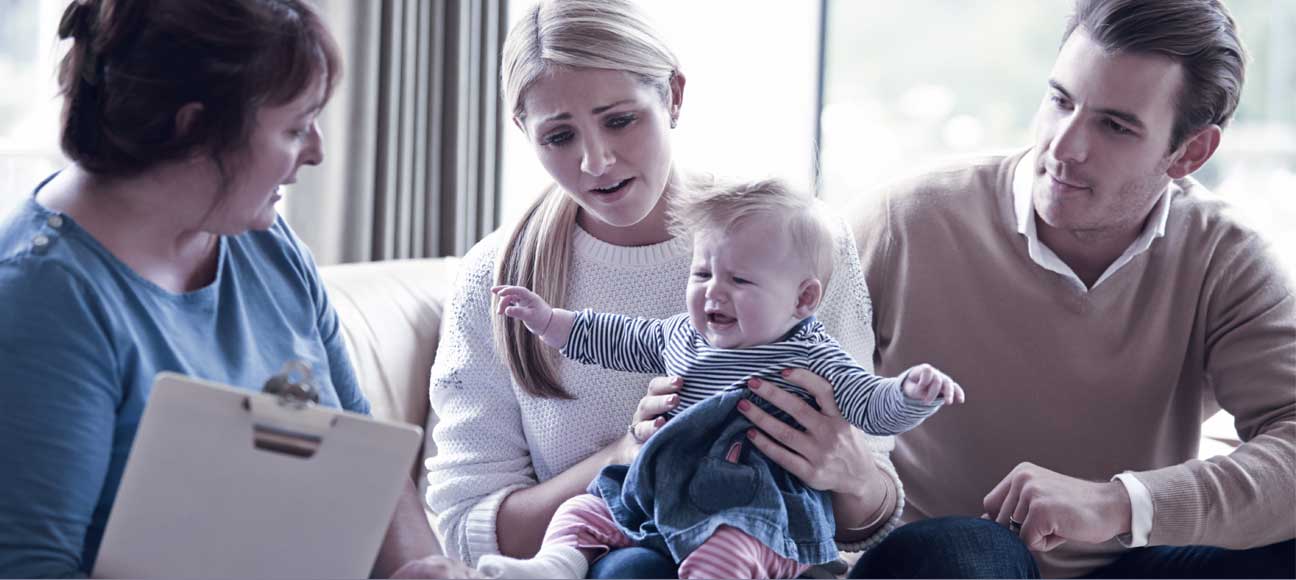Postnatal depression and
the importance of attachment

The birth of a new baby is overwhelming. There are significant changes for you, your spouse, your family and your baby too. In every change there are losses and gains. This is true for your baby and for you too. For 40 weeks he was surrounded by you in all ways. He was fed and held and warm and well in your womb. You provided for all his needs before he even knew he had them. Now that he has been born, he has to communicate all this to you. He has to tell you when he is hungry, tired, sick, cold etc. So, for your baby the birth experience brings gains and losses.
There are gains and losses for you too. There is a tremendous gain in giving birth, where you can hear your baby breathe and count his fingers and toes. But with the gain of the birth of your new baby, you might lose sleep, independence, spontaneity, adult company and intellectual stimulation, maybe financial security, predictability and control. The adjustment to this new life takes its toll and this is normal. Once you get to know your baby and your baby gets to know you, things usually improve and there is a better balance between the gains and the losses. That first smile, that first step, that first word are huge gains and often make up for the lost sleep, the lack of independence, identity, control and more.
SYMPTOMS OF POSTNATAL DEPRESSION
Postnatal depression occurs when you feel that things are getting worse instead of better. It also includes feeling highly anxious, withdrawn, angry, irritable, tearful and helpless. Mothers with PND have described their thoughts and feelings as:
- “I got anxious about the smallest things concerning my baby”
- “I thought I was going crazy”
- “I did not know who I was anymore”
- “I was trying to be the perfect mom but dying inside”
- “I did not feel real”
- “I felt I wasn’t being the mom I wanted to be”
DISPELLING THE MYTHS
There are many myths around having a baby which feed into postnatal depression and prevent parents from getting the help they need. These include:
1. Motherhood and fatherhood are natural and everyone knows what they are doing
Of course this is not the case. Parents need skills, information and training in their new roles. If every profession requires some training, surely parenting deserves the same. Why is it that society assumes that love is enough to raise children?
2. Bonding is automatic
Having a baby is like meeting your spouse at the wedding for the very first time. Your attachment grows as you nurture him in a very physical way, as you change his nappy, feed him, wind him and bath him. In the first year of your baby’s life it takes time to bond, and this is normal.
3. Mothers are blissfully happy to raise their children
Parenting is not always a happy time. There are moments of exhilaration and moments of despair. Just like children can’t be happy all the time, neither can their parents.
4. Perfect parenting is the way to raise happy children
There are no perfect parents, just like there are no perfect children. Our aim is to be “good enough” parents rather than perfect parents (Dr Winnicot). If we can tolerate mistakes in ourselves then our children have a better chance of tolerating mistakes in themselves too.
5. Mothers can handle their babies on their own
In the first few weeks and months, mothers need social, emotional, financial and practical support. This is a time where mothers need to be supported by the father, family and friends. When the outside world supports mom, then she can support the new baby. Providing for her financially, allowing her to rest, helping her with some of the practical arrangements for the other kids, helps to give her the support that she needs at this time.
These myths leave mothers and fathers feeling helpless, vulnerable and inadequate. Having a baby is not easy. Parents need time and emotional space to adjust. Parents need to adjust to the gains and the losses of their new experience in order to become real parents with real kids.
THE EFFECTS ON YOUR CHILD
What are the effects of PND on the emotional development of your children? The most important emotional task of the first 18 months of your baby’s life is to develop an attachment to a significant caregiver. Children need to build a good attachment since this is the basis for building emotional security and healthy relationships later on in life. Generally, a depressed mother is often an emotionally unavailable mother. This might be because her own anxiety or feelings interfere with her capacity to build a good enough attachment. This is supported by a study of two groups of babies at eight weeks of age. One group had mothers with PND and the other group did not. The results showed that those babies with a depressed mother were less responsive than those babies without a depressed mother. PND can disrupt the process of attachment and thereby affect the child’s emotional development. BUT IT IS REPAIRABLE. With treatment mothers are more able to contain their own emotional distress and focus on the needs of their newborn. How can this be facilitated?
WHAT TO DO?
1. Skin to skin contact
A baby’s sense of smell and touch is connected to his sense of you in the world. He knows your smell, your voice, and your touch. He builds an attachment when he hears you, feels you and smells you. Using a baby pouch is a wonderful way to maintain skin-to-skin contact while moving around the house.
2. Bathing, feeding, holding, changing etc.
are all ways in which parents build an attachment to their babies. The physical is the psychological in the first year. When you attend to his physical needs you are nurturing him, and this builds your relationship with him. When he is wet and you change him, when he is hurt and you comfort him, you are listening to his inner feelings and experiences and responding to his needs. He begins to trust that there is someone very important in his world who will look after him and so the attachment begins to grow.
Sheryl Cohen





